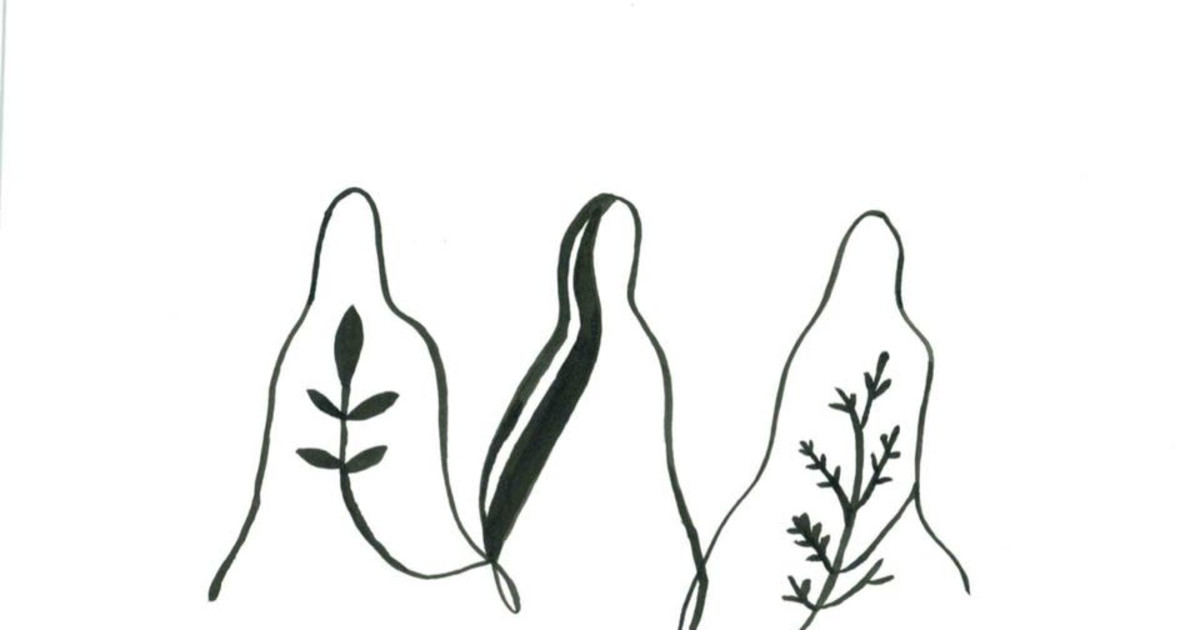Tansi, hello! Welcome to the final week of our online celebration of Black History Month with the Indigenous Brilliance Collective and Room Magazine. For the month of February, we have been sharing weekly content on the @indigenousbrilliance Instagram page, as well as over here on the Room website. We have shared interviews and content from featured Black and Black/Afro-Indigenous creatives, and continue to will dive into thought provoking questions, all related to the topic of Black/Afro-Indigeneity on Turtle Island. Be sure to check out the screening of award winning film Where We Meet by Karmella Cen Benedito De Barros and Lexi Mellish-Mingo screening online February 28th at 1pm (PST).
Today we will be exploring experiences of anti-Blackness within Indigenous communities and spaces, as well as building on ideas of cross-cultural solidarity between Black, Indigenous, and Black/Afro-Indigenous peoples. To support us in diving into these topics, I had the pleasure of sitting down with Amber Starks (AKA Melanin Mvskoke). In our conversation, Amber and I share our thoughts on community care, conflict resolution, Black and Indigenous solidarity, Anti-Blackness within Indigenous communities, the term BIPOC/IBPOC, and our experiences as Black-Natives on Turtle Island. We hope you enjoy it!

Amber Starks (she/her) is an Afro Indigenous (African-American and Native American) activist, organizer, cultural critic, decolonial theorist, and abolitionist. She is an enrolled member of the Muscogee (Creek) Nation and is also of Shawnee, Yuchi, Quapaw, and Cherokee Descent. Her passion is the intersection of Black and Native American identity. Her activism seeks to normalize, affirm, and uplift the multidimensional identities of Black and Native peoples through discourse and advocacy around anti-Blackness, abolishing blood quantum, Black liberation, and Indigenous sovereignty. She hopes to encourage Black and Indigenous peoples to prioritize one another and divest from compartmentalizing struggles. She ultimately believes the partnerships between Black and Indigenous peoples (and all POC) will aid in the dismantling of anti-Blackness, white supremacy, and settler colonialism, globally. In addition to activism, her passions include her family, travelling, reading, researching her ancestry, reconnecting to her tribes and learning her ancestral languages, and roller skating. She earned a Bachelor’s of Science in General Science (emphasis in Biology and Anthropology) from the University of Oregon.
Karmella Cen Benedito De Barros: Could you start by introducing yourself and talking about some of the work that you do?
Amber Starks: Hi my name is Amber, I am Muscogee, I am a citizen of the Muscogee Creek Nation, I am also of Shawnee, Yuchi, Quapaw, and Cherokee descent but I’m not enrolled in either of those tribes but I like to acknowledge those are my people also. Out of respect for tribal sovereignty I try to make sure I reference my decent just to declare relationship to them. I’m also a Black woman, African American. I grew up enculturated as a Black woman and I am kind of on a reconnecting journey to learn more about what it means to be Muscogee and also navigating my Blackness and my Indigeneity as a whole person, versus compartmentalizing those identities and showing up fully as both Black and Native.
So, I think the work that I do or the work that I’m trying to do is around affirming Black Indigeneity, my hope is that by having this conversation we speak to not only the hyper-invisibility of Indigenous Peoples here in the Americas and in the Caribbean but globally, but then in addition to that extra layer of hyper-invisibility for Black Natives, and speaking to the ways in which settler colonialism and white supremacy force Black folks, who are multi-dimensional (in their ethnic and/or racial identities), to forget those or are forced to not be able to exist in any of our multiple identities. My focus is to have conversations within the Black and Native communities around us decentering white supremacy and settler colonialism and hopefully by doing that we understand that our movements for Black liberation and Indigenous Sovereignty are parallel, they’re interconnected, and that we can do that work alone (without our oppressor). We don’t need our oppressors to tell us how to exist and what future we’re deserving of. I think that kind of sums up my work, like really trying to bridge the gap between our communities and help us to realize the future that we really want outside of our oppressors.
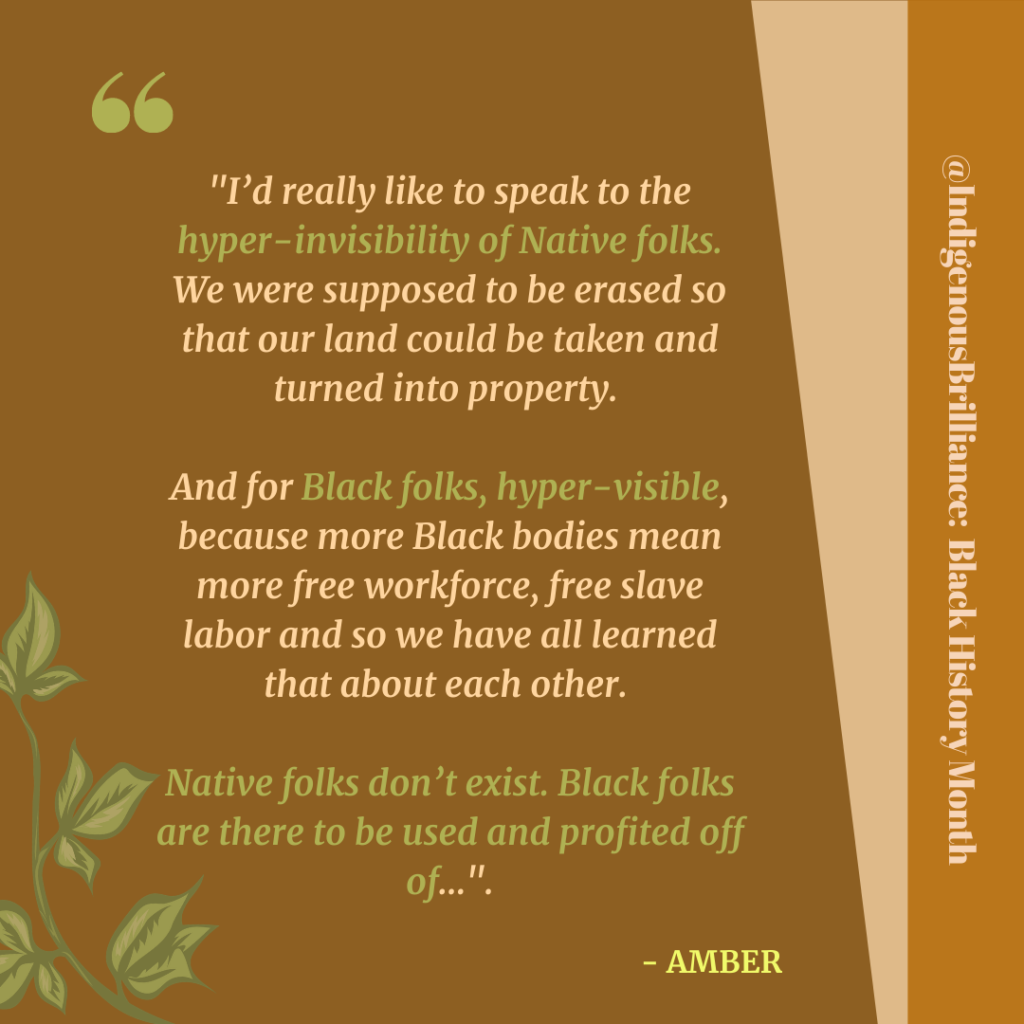
KB: That’s beautiful. I really appreciate you commenting on that multidimensional aspect of being a Black-Indigenous person, and how I also experience, oftentimes, feeling like not all of myself can be appreciated in certain spaces. Or held, understood, or accepted, and then having these perspectives and walking the world with these ways of being, I think that we have a lot to offer and a lot to teach people who maybe can’t adopt these different ways of seeing that we are forced into. So this month I’m really excited to be able to talk to people like yourself who are doing the work, who are really leading the way towards collective liberation and to an intersectional liberation that isn’t always a priority for people. So I really appreciate the work that you’re doing.
AS: Thanks. I really want it to be ok for Black Natives, or however people identify in their Blackness and in their Indigeneity, to be able to show up fully, even if we’re speaking to the one subset of our identities, like when I’m speaking to my Blackness, that isn’t my Indigeneity taking a back seat. Or when I’m speaking to my Indigeneity, it isn’t me hushing my Blackness, right. I am always showing up as a Black and Native person and there is no need for me to compartmentalize those identities because they’re not in competition, they’re not in contrast, they’re not in conflict, they are not any of those things. I want to make sure people understand that. Even if you’re racializing somebody as a Black body, or a Native body and they’re Black and Native, they’re showing up as both of those Identities.

KB: Totally, and I think that can be hard for a lot of people to understand or appreciate. That leads into the next topic that I wanted to discuss which is Black Indigenous erasure and anti-Blackness within Indigenous communities. I know that’s something that you talk a lot about on your social media and something that I think you do a really great job of calling into question and challenging for people, and I’m wondering if you could share a little bit about your experience and your thoughts on that, and ways that we can move forward collectively for the greater good of all of our communities.
AS: The one thing that I’d really want to highlight is that we have all learned white supremacy. We’ve all existed under settler colonialism for these last whatever hundred years. And so, it is not necessarily our fault that we’ve had to navigate these hard systems that in a lot of ways either want to commodify us, use our bodies for profit, or destroy us, like if we can’t be of use then our lives aren’t worth much. But I also think that we have to contextualize the oppression that our different communities face. So I’d really like to speak to the hyper-invisibility of Native folks. We were supposed to be erased so that our land could be taken and turned into property. And for Black folks, hyper-visible, because more Black bodies mean more free workforce, free slave labour and so we have all learned that about each other. Native folks don’t exist. Black folks are there to be used and profited off of. Even today, even though there aren’t those individual plantations, I want us to be aware of how the whole settler-state becomes the plantation. S you see Black folks on the forefronts shouting for our liberation and there’s this idea that Black folks are too loud and we’re in competition with anyone else who is oppressed, but the reality is our hyper-visibility is more about how our pain becomes entertainment. Our pain becomes normalized. And so, I think that there’s a misinformed idea that whoever (of the oppressed) is the most visible to the oppressor will achieve liberation the fastest.
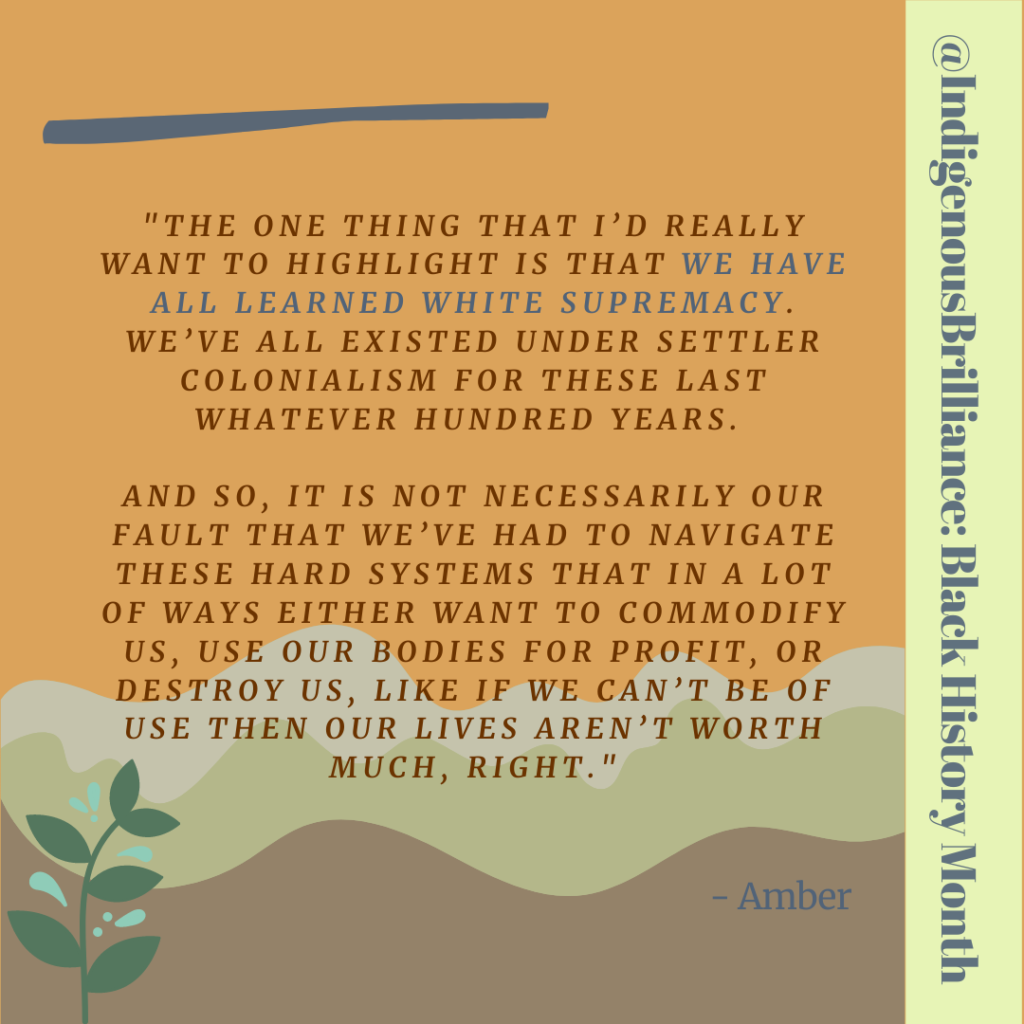
Also, I think that we don’t often understand that there’s a hierarchy within the triad of white supremacism, settler colonialism, and racial capitalism so, because we all learn this hierarchy, even non-Black natives, we learn the position Black folks are suppose to be in, on the bottom. We learn that Black folks are not supposed to be multidimensional, we’re only supposed to be Black (as if that is a bad thing to begin with), for the sake of commodifying us. So for those of us that take up space in both our Blackness and our Indigeneity, it becomes problematic when one is still seeing the world through an oppressor’s lens, through an oppressor’s ideology. So that’s where I think anti-Blackness comes in, in a lot of ways. It’s that fear that Black folks are going to take the place of Native folks or even perpetuate anti-Native violence and erasure.
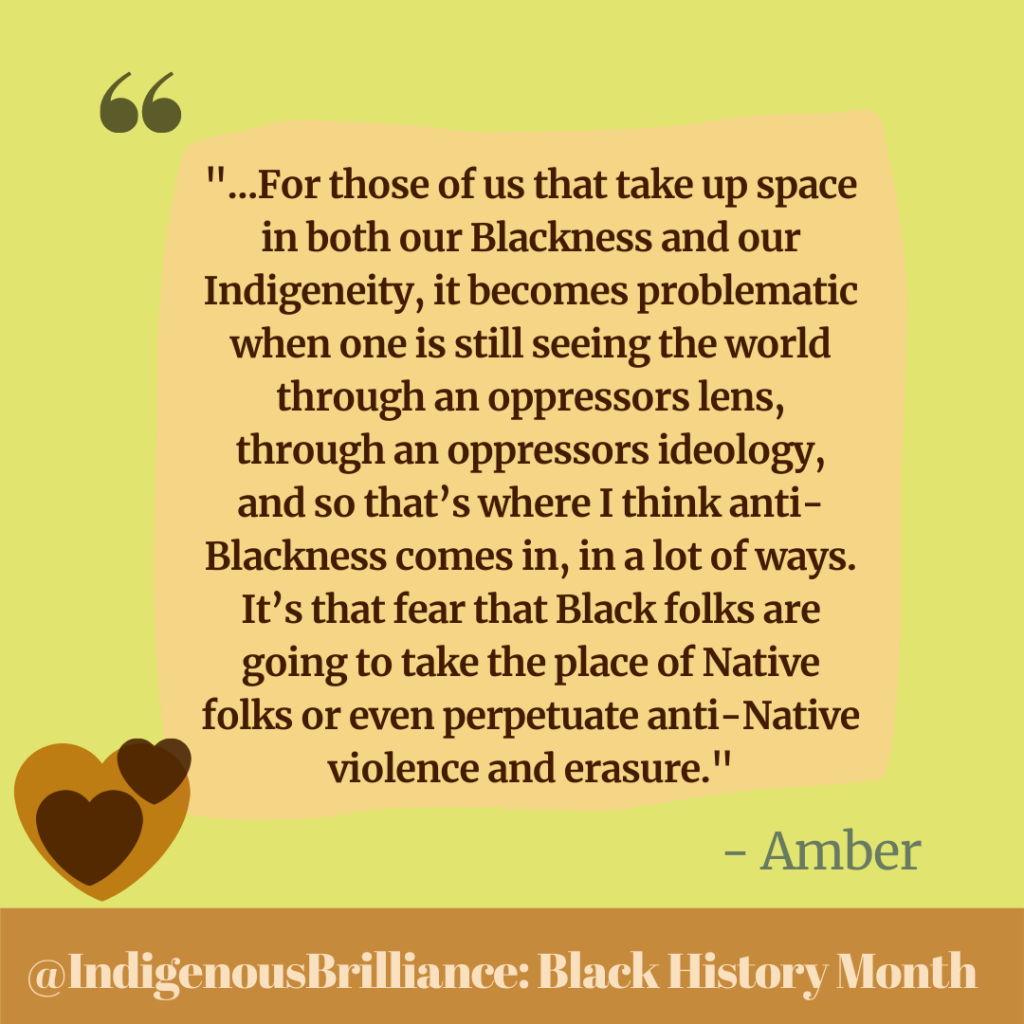
And we should absolutely acknowledge that there definitely are some problematic people in the Black community who try to steal Native identity and participate in the erasure of Native folks by claiming Black folks are the “actual” Indigenous peoples of the Americas. It is such a violent ideology. It doesn’t help either of our communities, this belief system.
So having this balanced conversion about lateral oppression is so important, because we’re not one another’s oppressor. We’re not one another’s enemy. This whole settler-state plantation wasn’t concocted or manufactured by Black or Native folks, this is not something we’ve done to ourselves or one another. So I think that if we’re so focused on the lateral oppression, we miss the horizontal oppression that is the real issue. And it doesn’t mean that we don’t deal with the lateral oppression, and I think that’s what I am trying to speak to when we’re talking about anti-Blackness or the erasure of Native folks by anti-Native Black folks. It’s a hard conversation because, again, sometimes people feel like our two communities are in competition, and this is the narrative that I’m hoping to counter, hoping to reframe: we’re not one another’s competition and both of our peoples have existed outside of white supremacy before and we will again. That’s the goal. So we have to start envisioning that, we have to start participating in that, and that means talking to one another, that means dealing with the harm that has happened, and contextualizing the harm as a tool of white supremacy and settler colonialism.
Why we don’t say “IBPOC”
KB: One very obvious example to me of that lateral oppression and anti-Blackness that we see within some Indigenous communities is this acronym of IBPOC switched from BIPOC, so putting the Indigenous before the Black, and I’m wondering if you can speak a little bit to that and to why this acronym is harmful and why it is anti-Black and why it is we need to challenge it and bring it into question?
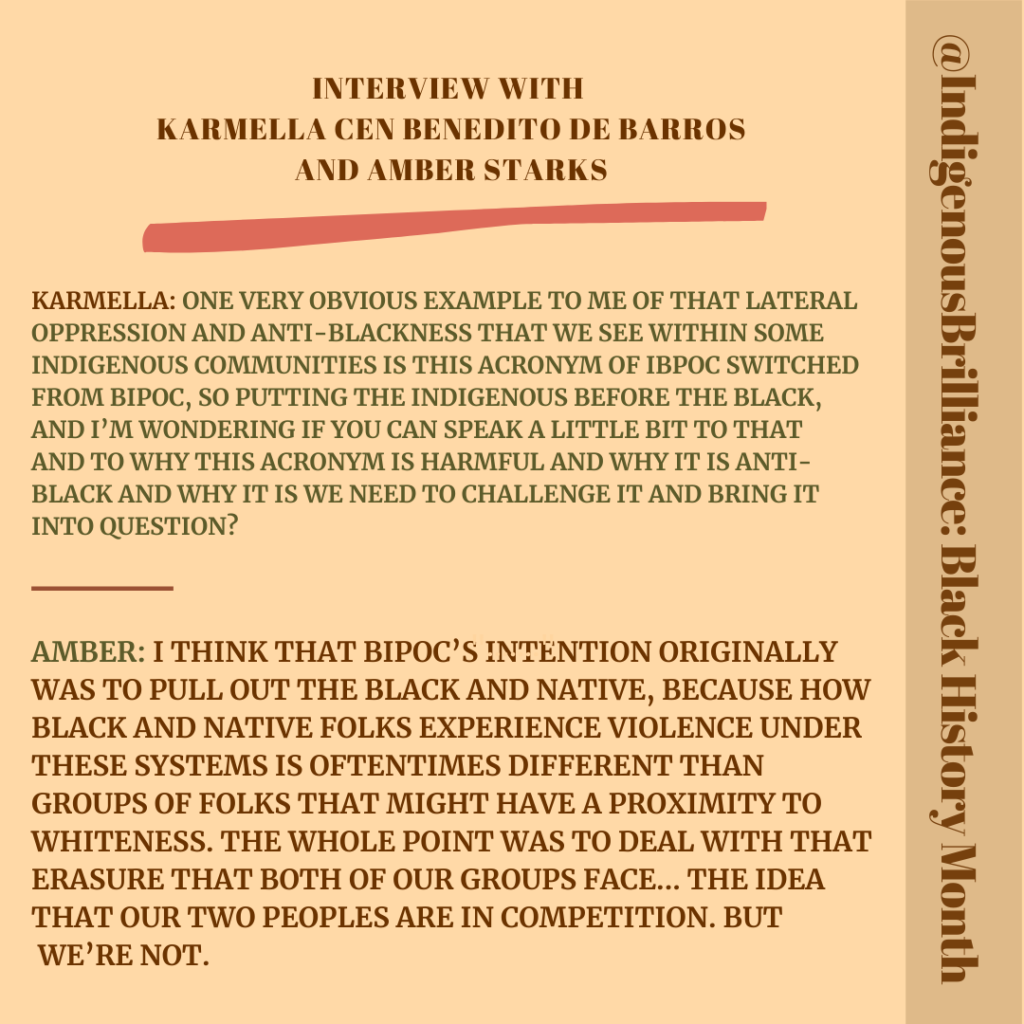
AS: You know I hadn’t even heard of that before you and I had talked about it a little bit, and I didn’t even know that was happening. That surprises me in a lot of ways and then I’m kind of like, of course. I think that BIPOC’s intention originally was to pull out the Black and Native, because how Black and Native folks experience violence under these systems is oftentimes different than groups of folks that might have a proximity to whiteness. The whole point was to deal with the erasure that both of our groups face. So the idea that someone feels threatened because the “B” comes before the “I” and maybe not even understanding, whoever coined BIPOC, I don’t know. I don’t know if it was a Black feminist, like I don’t even know the origins of it, but the idea that, “that doesn’t sound right, lets switch them because this should be more important than that,” again, goes back to that idea that we’re in competition. The idea that our two peoples are in competition. But we’re not. So I think the harm in that is being intentional about saying “Black people shouldn’t go first.” The thought of that makes me feel like, what is so harmful about saying BIPOC when we’re thinking about Black and Native folks being pulled out of the POC acronym? Because I think that BIPOC, just that acronym, is a tool of revolution, it’s a tool of resistance because, it’s Black, Native, Indigenous, and other people of colour, forming a language that decentres whiteness.
So when we started to say “I want to decenter the other person of colour” that is why I think that is problematic. I can see if no one had come up with BIPOC and somebody just said IBPOC, I wouldn’t be like “oh, we should put the ‘B’ first.” But the idea that BIPOC existed and someone felt so threatened by the “B” being first, instead of being like “is BIPOC another tool of erasure that we need to reformulate and come up with a whole different way?” It wasn’t even that. It doesn’t sound like that, it sounds like “let’s switch the positions because Black people are unworthy of being first in this acronym.” And that’s what’s terrible, that’s really anti-Black. I don’t think BIPOC’s intention was to be anti-Indigenous. It sounds like it’s an attack on the idea that Black shouldn’t have a space, or a first place in anything. Yea, that’s pretty terrible, pretty harmful, and violent.

KB: Absolutely and I’m interested in looking more into the history of the acronym to know where it comes from, and I imagine it does probably come from a place of Black liberation being the priority, also acknowledging the land that we’re on, on Turtle Island, and acknowledging the shared experiences of oppression that Black and Indigenous folks have. So, to me, the BIPOC acronym is respecting Indigenous folks, and I can imagine where the IBPOC comes from is the idea that we are on Native land, that Black people are uninvited guests, and so perhaps the idea is like, “know your place,” kind of.
AS: First my instinctual response to that is that Black folks didn’t decide we were going to come here and be colonizers, to be settlers. We are descendants of stolen Indigenous peoples of Africa, so erasing our Indigeneity from Africa is problematic if an Indigenous person is doing that. Yes, this is Indigenous land, but we don’t have to be anti-Black in saying “Yes, this is Indigenous land.” There is no reason to be anti-Black in claiming us, Indigenous peoples of the Americas and the Caribbean, as rightful stewards of this land, of these lands. No need to attack Black folks, because I think like you said with BIPOC, the intention could have been, yes we’re going to centre Black and Indigenous people in this conversation of people of colour, but if it was meant to be anti-Indigenous, they didn’t even have to say the Indigenous part. It could be “BPOC” right. I think the BIPOC intention was about “lets centre Black and Indigenous people.”
Again, I don’t know who came up with it, but it also reminds me of the conversation we were having at Indian Country when Black Lives Matter was really ramping up and how folks were like “Native lives matter too.” And it goes back to that conversation of competition in response to Black Lives Matter: we shouldn’t be saying anything other than yes, Black Lives Matter. We can talk about Native Lives Matter, but we start to compete when we start to say “our cause is more worthy of your cause.” Or, for me, it’s the response of Blue lives matter, this “wait a minute, you’re not including us.” So it’s like, Black folks can have a conversation about Black folks and that doesn’t mean that no one else matters. And the Indigenous community, imagine if Black folks took up the Missing and Murdered Indigenous Women, in saying, what about Missing and Murdered Indigenous Black Women. If we usurped that, I think we would find that so offensive, and rightfully so. So I think, saying Native Lives Matter or IBPOC in response to or as a counter to Blackness is where it’s problematic.
So, yes, Black and Indigenous people, we have struggles. We both have struggles, they both should be addressed, but not in competition with one another. We have a mutual oppressor, not one another. It doesn’t mean we haven’t had lateral oppression, right. We can talk about the ways in which Black and Indigenous folks have been used as tools of white supremacy in settler colonialism. And the ways that we’ve participated as individuals, because we can cause harm. But that’s the hard work we’re going to have to do if we want to get to an authentic Black liberated future, and an authentic sovereign Indigenous future. And I will say as a Black and Native activist, as an Afro-Indigenous activist, a lot of the pushback that I get is, you know, “you’re only talking about Black people” and it’s like no, I’m talking about Black and Native people.
Because I’m racialized as a Black person, me speaking in Indigenous spaces can sometimes feel like a threat, like I’m taking up too much space, like I’m speaking for Indigenous people instead of speaking as an Indigenous person. And so I think this whole idea that Blackness can’t be Indigenous to the Americas or the Caribbean, or worldwide. Like Black folks in Africa are Indigenous to Africa. But again, we’ve all learned white supremacy, we’ve all learned anti-Blackness, we’ve all learned to erase Indigenous peoples. These are the things that we should be aware of even when we’re doing our own work in our own communities so that we don’t perpetuate the very things that we’re trying to dismantle.
KB: Totally, and that awareness that you’re talking about can be a very difficult task for people to accept as our own, especially if we are oppressed individuals. For example, being a Native person, or being a Black person, or being a Black Native person and realizing that you still can uphold tools of colonialism, that’s hard, because at the same time, we’re also still being oppressed. You might not have an answer, but I’m wondering if you have any advice or motivation or prompts for people who are trying to start doing this work of questioning the ways that we as oppressed people are upholding systems and structures of colonialism?
AS: I think we have to be honest with ourselves that all of us have participated in a way. Even if it was unintentionally, and unfortunately, like I said, we’ve all grown up in these systems, and I think it takes a conscious effort. It’s like a daily choice not to uphold these things, and to resist them, to challenge what we think about something, why think about something. Whoever coined “IBPOC,” like really think about your intention, like why is that necessary. There is that sense of hyper-invisibility, but is that Black folks’ fault? Where are we placing the blame of our oppression? Like, asking ourselves that question. I think it’s very important. And understanding our fears of being continuously oppressed. It requires us to be vulnerable and it requires us to have these kinds of conversations and know that we’re going to come with our frames already, like our understanding of the world. Because sometimes with harm that we’ve experienced with lateral oppression, we’re not seeing Black folks or Native relatives as individuals. And this is the thing that I think we’re not often aware of: how white supremacism and settler colonialism have taught us to group one another, so if one person does harm, the whole group has done the harm. So if a Native person does something to a Black person all of Indian Country is bad because of it.
If a Black person has done something, all Black people are like this, and this is the way in which our humanity, our individuality, and our self determination gets stripped from us. And I think we also have to be realistic. Not everyone is going to be for our liberation. Not everybody is going to be for our sovereignty. Even within our groups. You know, I have come to learn that. Being online, people can be awful. People can be very violent because they think that the way you’re doing it isn’t the way it should be done. So I kind of have come to this understanding, like if you don’t like me, that’s okay. Don’t like me, but do the work, the real work is dealing with our oppressors. Yeah, I don’t have the answers but I do think we have to have these conversations and I think we have to contextualize our oppression. We have to be honest with ourselves about how we think and feel about other groups of people, and then, who’s narrative are we believing? Are we believing the narrative that we’ve learned directly from Black folks, directly from Indigenous folks, directly from Asian folks, directly from Pacific Islanders. We’ve learned about each other from our oppressor.
We don’t have first-hand knowledge of other folks who are dealing with the oppressor under white supremacy. So, getting uncomfortable, showing up for each other, listening to one another, not getting defensive, not trying to be in competition with one another, like all of that, is a tactic of divide and conquer and we all know what divide and conquer does. Individuals are not going to like each other. It’s not about that, it’s about dismantling all the stuff that’s been destructive for all of us, because this isn’t our inheritance. We’re not deserving of this. We didn’t do anything to have these life experiences of violence and terror and erasure and everything else. So, if we remembered that I think we can start taking steps forward. I mean this is going to be hard work. We just have to accept that.
KB: I appreciate that reminder because I think a lot of times if it’s not easy then we won’t want to do it. Especially when we’re all so tired already. It’s easy to feel like we don’t deserve this, it’s not fair, why is this on us, but the reality is this is what we’re dealing with and we need to work together to move forward and to look beyond ourselves and to do this community work so that future generations have access to the liberation and the sovereignty that we’re all dreaming of.
AS: I often think about the work, the lot that our ancestors had. Like the everyday hard, death and destruction that they experienced, that we’re not proximate to in a lot of ways. We have our own struggle for real, but we are where we are because our ancestors kept fighting that stuff so that we didn’t have to experience that. I think about the ways in which my grandmother and my great-grandmother who are both Afro-Indigenous but, weren’t racialized as Black, like you wouldn’t say that they were Black necessarily by looking at them, but not even them being able to speak to their Blackness necessarily. Like a lot of Black Natives had to pretend their Blackness didn’t exist. Now I get to be like “I’m Black and Native.” My foremothers and ancestors did work even if it wasn’t intentional so that I now I can say something. So, you know, we plant a tree knowing that we might never see it grow. That’s what we’re doing. We’re planting trees of liberation and sovereignty.
KB: Yeah, and that’s beautiful work that we get to be a part of.
AS: Yes. We get to do this. That is something that we need to reframe, we need to reframe our language, we need to be creative in our resistance and understand that we get to do those things, we get to plan for the liberated and the sovereign future that we want. I think the other day I tweeted “The best thing about being Black and Native is that I get to be Black and Native.” And that is amazing, right, because there was a time where Black and Native folks didn’t get to be like that, they had to choose.
KB: Yeah, I think that’s beautiful. And reminding ourselves as well that through all of this work, we also deserve rest, and we deserve care and tenderness because it is challenging, but a lot of us are lucky in that it’s a choice. So we choose to do the hard work, but we also choose to take care of ourselves and others through it.
AS: Right, because that’s actualized liberation. Actualized sovereignty is when we get to rest. Where we get to sleep in, we get to say, yeah, I’m going to take a moment. Get off social media, whatever. That right to self determination is liberation. It is sovereignty.
KB: That’s been a big learning for me this month because I’m putting a lot of time and energy into doing all these interviews and writing all this content and hopefully it will be educating people on the topic of Black Indigeneity, and I’m like, damn okay. This is exhausting, even though it’s really really exciting and beautiful. I’m also really tired and finding that balance and outsourcing and asking for support and all of that is such a beautiful unfolding of learning for me, and I’m like, that’s how this becomes sustainable.
AS: Yes, Absolutely, because I think we forget sometimes that we’re not meant to be martyrs. We’re not meant to be exhausted and broken and destroyed by these systems or we’re fighting them. Like this is community work and I think that sometimes we have individual vision and I think sometimes we need to see something to the end. But I think in all of this “activism” or work that I’m doing, I would say that the thing that has been my strength is the community that I’m a part of. The community that pours into me when I’m done. There have definitely been those times when I’ve wanted to throw my own into the ocean. I would say that it’s the community that has kept me and has rooted for me and poured into me and reminded me that the work that I’m doing has value. So I can’t do this alone because I need the community as much as some of the things that I say are needed as a part of our path to sovereignty and liberation. So, I agree with you that reminding ourselves that we are deserving of rest and help and support, and that we don’t have to make ourselves martyrs.
KB: Thank you. Is there anything else you would like to touch on or share?
AS: No. This is great. I am so glad that we got to chat. For me, this is where the revolution happens, when we talk one-on-one, like I tell people, “ the DMs are where the revolution happens.” You know, where we hash out thoughts even if there are disagreements because we will disagree. But we’re going to have to talk through it instead of being like “I don’t like you” or “I’m going to slander you.” Like, we need to sit down and we talk and we may not come to an agreement every single time. I think respecting that we’re all trying to get there, we’re all trying to realize something, and there might be times where what I’m saying might be working and there might be times where what somebody else is saying might be the best thing for the time. So I think we have to be flexible in our tools of resistance. And we have to be open to the possibility that we’re wrong.
KB: Yeah, and I think, again, that’s doing such beautiful and important work. So thank you for sharing with us everyday and thank you for having this conversation with me.
